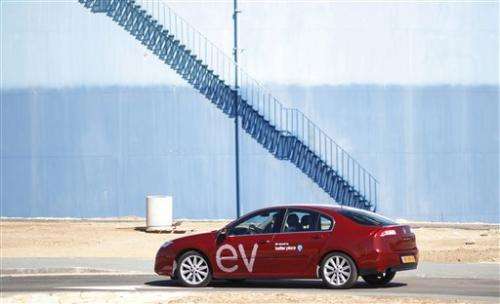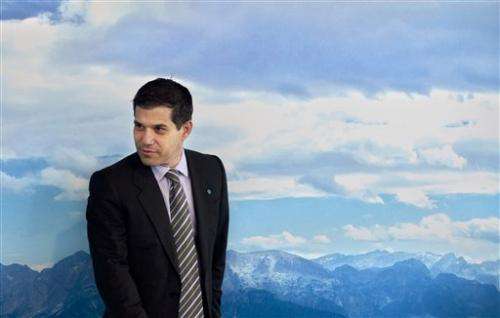Trailblazing Israeli electric car company to close (Update 2)

It was an audacious idea that came to symbolize Israel's self-described status as "Start-Up Nation," a company that believed it could replace most gasoline-powered cars with electric vehicles and reduce the world's reliance on oil—and all within a few years.
But it all came crashing down.
The company, Better Place, started out as a source of pride and a symbol of Israel's status as a global high-tech power, but it suffered from a local brand of hubris and overreach. On Sunday, it announced plans to liquidate after burning through almost a billion dollars and failing to sell its silent fleet of French-made sedans to a skeptical public.
"This is a very sad day for all of us. We stand by the original vision as formulated by Shai Agassi of creating a green alternative that would lessen our dependence on highly polluting transportation technologies," the company said. "Unfortunately, the path to realizing that vision was difficult, complex and littered with obstacles, not all of which we were able to overcome."
It capped a stunning fall from grace for Better Place and its founder Agassi, a former high-tech whiz kid who sought to change the world by building a revolutionary network of battery-swapping stations.
Agassi, 45, believed that in an era of global warming and rising oil prices, environmentally friendly electric cars could be the wave of the future, if only a way could be found to overcome the limited range of their batteries.
Better Place offered an elegant solution. The vast majority of travelers who commute short distances could plug in their cars at home or work each day to keep their batteries recharged. For longer distances, customers could stop at the swapping stations, remove their used battery and replace it with a fully charged one in a matter of minutes.
Agassi's native Israel was chosen as the company's main laboratory, and a network of several dozen stations was installed, offering travelers nationwide coverage.
Israel was a particularly ideal testing ground, thanks to high fuel prices, a supportive government, its relatively small size and dense population centers. The cars were expected to appeal to Israel's tech-savvy population, and the ability to weaken the political clout of its oil-rich enemies was an added plus.
The project won the support of President Shimon Peres, received generous financial incentives from the Israeli government and an endorsement from former President Bill Clinton.

Agassi, a former top executive at software maker SAP, became a celebrity CEO. He was a central character in "Start-Up Nation," a best-selling book about Israel's high-tech industry, he was named to Time Magazine's list of the 100 most influential people in 2009 and became a fixture at international conferences such as the World Economic Forum in Davos, Switzerland.
In roughly five years, Better Place raised some $850 million from investors like General Electric Co., HSBC Holdings PLC and the European Investment Bank. Israel Corp., controlled by billionaire Idan Ofer, was the largest shareholder. Agassi persuaded French car maker Renault to make a customized electric version of its Fluence sedan.
Agassi promised to 5,000 of his cars on Israel's roads by the end of 2011 and predicted that a majority of cars sold in Israel would be electric by 2016.
"The end of the oil era will not come because we ran out of oil—it will come become we don't want to use oil any more to drive," Agassi told The Associated Press in a 2011 interview. "I can guarantee you that we will finish the need for oil as an energy source for cars before we run out of oil in the ground."
The numbers never panned out. Only about 1,000 Better Place cars are on the roads, and the company ran into trouble with investors. Last October, Agassi was forced to step down, and the company never gained its footing. Reached by the AP on Sunday, Agassi declined comment.
Better Place claimed to be the first nationwide network of battery-swapping stations. Other countries, such as Germany, have public networks of charging stations, while in other places, travelers typically recharge their vehicles at home.
For the most part, electric cars have not enjoyed their expected success anywhere. The battery alone in an electric car costs as much as a new gasoline-powered car, and electric vehicles are not selling nearly as fast as once projected. General Motors expected to sell 60,000 Chevy Volts globally last year, but sold just half that many. Sales of Nissan's all-electric Leaf grew 22 percent around the world last year to 26,000, short of Nissan's projected 50 percent growth.
One exception has been American electric car maker Tesla Motors, which recently posted its first profitable quarter.
Among Better Place's mistakes, the company misjudged consumers' willingness to embrace the new technology. There was the issue of "range anxiety," the fear of some that the batteries, with ranges of about 160 kilometers, or 100 miles, would conk out in inconvenient places.
Others balked at the price. The cars sold for roughly $32,000, comparable to other sedans in Israel. And the pricing plans, roughly $300 to more than $500 a month depending on mileage, did not provide enough savings to overcome the doubters.
Sunday's announcement left many questions unanswered, especially what will happen to its cars and charging stations. Better Place has also installed a network of stations in Denmark and has operations in Australia, the Netherlands, China, Hawaii and Japan.
Several hundred workers in Israel are expected to lose their jobs, and stunned customers said they did not know whether they would be able to continue driving.
Local celebrity Arik Zeevi, a former Olympic judoka, said he was sorry to see the company go.
"I really like the idea of not being dependent on gas. That is something that really speaks to me, and beyond that I really enjoy driving the car. It is an amazing experience," he told Channel 2 TV. "I will be really bummed out if I need to give that up."
In its court motion Sunday, Better Place said it was seeking the appointment of a temporary liquidator. In light of its failure to raise additional funds, the company asked for the court's assistance in protecting the rights of its employees, customers and creditors.
"On a personal level this is one of the hardest moments of my career," CEO Dan Cohen said Sunday. "The feeling this morning is one of loss because we didn't reach the finish line, the finish line is still far away."
A look at select electric car makers' sales trends
Better Place is the latest casualty in an electric vehicle market that has struggled to lure consumers who are skeptical of the short battery life, high price, and a lack of infrastructure that can require recharging stops of several hours on long trips.
Here's a look at sales trends for select electric car manufacturers:
— Tesla Motors Inc. of Palo Alto, California.
VEHICLE: Model S
PRICE: Starts at around $70,000.
SALES TRENDS: The Model S went on sale last summer. Tesla delivered 4,900 cars in the first quarter, beating its guidance of 4,500. This month it boosted its guidance for worldwide deliveries in 2013 to 21,000, about 1,000 more than its previous target. It expects to deliver just over 4,500 cars in North America in the second quarter.
— Fisker Automotive Inc. of Anaheim, California.
VEHICLE: Karma
PRICE: $100,000
SALES TRENDS: Fisker has sold fewer than 2,000 Karmas, despite early projections of 11,000 sales per year, and it hasn't produced any cars since its battery supplier filed for bankruptcy protection last year.
— CODA Holdings Inc. of Los Angeles
VEHICLE: The Coda.
PRICE: $37,250
SALES TRENDS: CODA began producing its five-passenger sedan last year, estimating it would sell 10,000 to 14,000 vehicles in its first 12 months. Instead, it sold around 100. The company filed for bankruptcy protection earlier this month and said it plans to quit the auto business altogether.
— BYD Co. of Shenzhen, China.
VEHICLE: BYD e6, among others, including electric buses.
PRICE: Estimated around $35,000
SALES TRENDS: BYD sold just 1,700 electric cars and 700 electric buses in 2012 and says it expects to triple that this year.
— Nissan Motor Co. of Yokohama, Japan.
VEHICLE: Leaf.
PRICE: Starts at $21,300 including federal tax rebate.
SALES TRENDS: More than 62,000 Nissan Leaf units have been sold worldwide since the launch of the hatchback in December 2010.
© 2013 The Associated Press. All rights reserved.



















